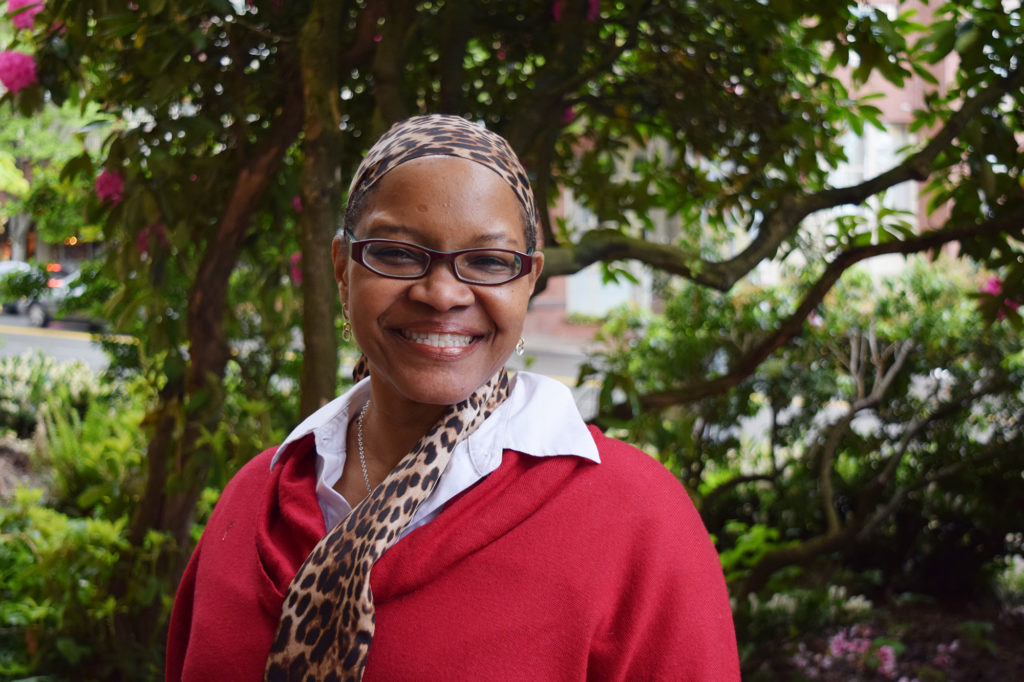Natasha Martin is reaching her 15th year at Seattle University, but 2016 was her first year as the Chief Diversity Officer. Martin’s new role is centered in shifting the climate and culture of the university into one that the university refers to as “inclusive excellence.”

SU’s Chief Diversity Officer, Natasha Martin, coordinated a series of Real Talk sessions in order to promote student inclusion.
To make these shifts, Martin has spent the past year connecting across the campus and pursuing creative ways of gathering feedback.
The role of Chief Diversity officer is the first of its kind at Seattle U. President Fr. Stephen Sundborg, S.J., appointed Martin at the end of last summer, and she’s spent this academic year growing relationships and building a foundation based in diversity, equity and inclusivity.
Martin’s job revolves around leading university-wide efforts to ensure a welcoming climate and culture for every member of the community.
“I think it’s really important for people to understand that what we’re trying to do is to create and sustain a context, the environmental conditions for all of us to thrive—for everyone to feel welcome, valued, respected and to find their place in the institution,” Martin said.
Martin stressed that the task is one that spans the boundaries of the institution: this is a community- wide endeavor, Martin said, and although she is centered as the anchor, she argued that there is a crucial partnership with students, faculty and staff in order to make a true shift in the climate and culture of the university.
The position was created late last summer after a task force report and recommendation stated that the university should appoint a Chief Diversity Officer. Martin was a part of this task force, and her success within the group led to her appointment as CDO.
“There was a sense that we don’t need to find the expertise and the skillset from off campus because we’ve already got it here, and Natasha’s leadership made her a natural candidate for that,” said Interim Provost Bob Dullea.
The role of Chief Diversity Officer is a senior level position for which Martin works three-fourths of the time, with the other quarter spent as a faculty member in the School of Law.
For Martin, this year has consisted mainly of building relationships among the Seattle U community to gain feedback and stimulate discussion with university stakeholders.
An average day for the Chief Diversity Officer consists of connecting with people in the community, and these efforts led to the creation of meetings called Real Talk, which Martin has hosted three times this quarter.
Martin says that Real Talk was created as a way to connect with students and discuss the atmosphere of Seattle U and the ways in which it could be more welcoming.
The gatherings have been relatively small this year, but Martin hopes to draw a larger crowd at future discussions.
The talks are discussion-based, and students are encouraged to share authentically and be honest.
Miguel Nsue Bindang, a student at Seattle U, attended the meeting as the president and founder of the Seattle U Hip Hop Club. He thought the set of questions provided were very helpful to dive into, but he hopes that Real Talk is able to lead to tangible change within the institution.
“[There are] a lot of conferences, a lot of meetings and things stay the same, so I hope that whatever this endeavor is, I hope the leaders take action to find a way to satisfy justice and build harmony in the community,” Bindang said.
This sentiment is not a new one, and Martin stressed that in order to develop the ideas generated into positive change, her work is a marathon, not a sprint. For this reason, the key work Martin has been focused on this past year has included laying a foundation, building relationships and designing the role of CDO.
Martin says her job is one that works toward the community changing their heads, hearts and habits, which is a large task that takes time and care. In the future, Martin hopes to focus on creating a student advisory board, bias-response protocol and climate care approach, inter-group dialogue, consultations for student experiences and a larger diversity council.
She plans to continue her Real Talk sessions next year in order to gain feedback and ideas from the student body.
“The best way for us to make advancement and to bring our ideas to fruition is that we’re all in this together,” Martin said. “So I would just ask people to reach out me, be a part of this work, not to settle for safe.”
Tess may be reached at
towen@su-spectator.com







